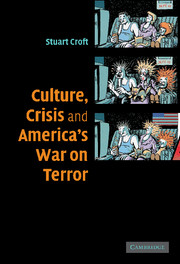Book contents
- Frontmatter
- Contents
- List of figures
- Acknowledgements
- Introduction
- 1 Disrupting meaning
- 2 Deconstructing the second American 9/11
- 3 The decisive intervention
- 4 The institutionalisation and stabilisation of the policy programme
- 5 Acts of resistance to the ‘war to terror’
- 6 The discourse strikes back
- 7 Conclusion
- Select bibliography
- Index
Introduction
Published online by Cambridge University Press: 15 December 2009
- Frontmatter
- Contents
- List of figures
- Acknowledgements
- Introduction
- 1 Disrupting meaning
- 2 Deconstructing the second American 9/11
- 3 The decisive intervention
- 4 The institutionalisation and stabilisation of the policy programme
- 5 Acts of resistance to the ‘war to terror’
- 6 The discourse strikes back
- 7 Conclusion
- Select bibliography
- Index
Summary
The juxtaposition of ‘terror’ and ‘culture’ is provocative: after all, is terror not the antithesis of culture? Terror represents the brutal, the barbarian, the destructive, and culture is that which represents the highest achievements of humanity. Perhaps. Yet the meaning of terror is constructed; and culture influences opinion and attitudes powerfully at the popular level as well as through ‘high’ culture. The meaning of terror attacks, and what should be done about them, is produced and reproduced by political elites and by the producers of popular culture. Without understanding what has occurred in America at the level of popular culture, its meaning and impact, it is not possible to fully comprehend the American crisis discourse that is the ‘war on terror’.
Discourses create and reflect identities, and thus they construct those who are our allies and those who are our enemies. When not in flux, they settle who ‘we’ are, and who ‘they’ are; what ‘we’ stand for, and what ‘they’ mean to ‘us’. They construct the space for ‘our’ legitimate activity, and the space for the behaviour we will (and will not) tolerate from ‘them’. At times ‘we’ and/or ‘they’ construct such hostility that violence results, and lives are lost. And both ‘we’ and ‘they’ may blame the other, and engage in absolution of responsibility. The creation and expansion of such constructions is mostly played out in and through a crisis, and it is crises that are the engines of radical discursive change.
- Type
- Chapter
- Information
- Culture, Crisis and America's War on Terror , pp. 1 - 14Publisher: Cambridge University PressPrint publication year: 2006



